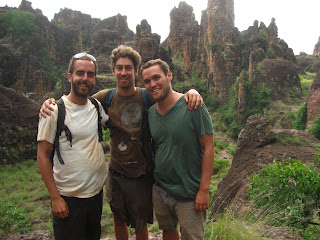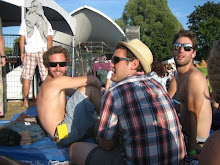






Well here we are, the final post. Sitting here in Sweden we couldn't be further removed from the chaos and energy of West Africa. Sparkling cleanliness, uber-efficiency, and fresh-off-the-runway fashion. And hot water. Over the course of countless discussions during the trip there emerged numerous themes, ideas, and unanswerable questions. We thought we'd share our ideas here, hopefully to be discussed in person later. If you wish to discuss with Dan, please fly to Sweden. If you would like to discuss with Peter, feel free to fly to Scotland. If Evan is your choice then okay, Vancouver will do for now.
One of the prevailing concerns we all had before arrival was personal safety. Based on the region's tumultuous history, this seemed somewhat justified. From Evan's proposed 12-wallet mugging deterrent system, to Dan's (patent pending) concealed moneybelt alternative, to Peter's expired credit card and BCAA wallet decoy, we were ready. Worries ran rampant of gunpoint street robberies, violent politically-motivated riots, and elaborate tourist scams. But, a former civil war does not inherently make for an unsafe country today (see US, Spain, Vietnam, etc.), something we were thrilled to discover. In many of the places visited, pride of country was very important, highlighted especially in nations actively trying to get back on their feet. Citizens seemed very concerned with everyone's security, especially tourists. Aware that international perceptions can drastically change based on one person's negative experience, we were very well taken care of and it seemed as though no one would let harm come to us. We hardly ever felt threatened.
Prior to the 'tourist trail' we didn't really meet other backpackers, possibly based on government warnings and some of the perceptions noted above. We did, however, meet oodles of aid workers and volunteers from various First World organizations. Everyone was young, enthusiastic, and genuinely wanted to help. After the inevitable jokes about us not really doing anything, a repeated discussion topic was the effectiveness and merit of both short-term projects using recent high school graduates as unskilled volunteers and long-term efforts with big money from foreign governments. There is an undeniable positive effect to cultural exchange - the three of us have done foreign volunteer work as unskilled young people - gaining insight in this way into the problems of development is tremendously important. However, it's vital not to be deluded into thinking that this counts as responsive aid. Most volunteers we encountered seemed very realistic about this and were frustrated by the lack of sustainable impact.
So do we do away with unskilled youth-oriented volunteer projects? In favour of what? As our good friend Charlie Hare once asked, "what should young, energetic, and enthusiastic people with a social conscience do with their lives?" Young people aren't necessarily going to focus this energy on the developing world unless they have some more personal, familiar connection, making this type of cultural exchange invaluable. But that's not the entire picture.
Before we move on, let's be clear. Aside from the Umoja Foundation Without Borders work, we were in Africa strictly for our own experience. Different from aid impact, our impact came as tourists. Does tourism count as aid? Is it a viable avenue for development? In a country, for example Mali, landlocked and with virtually no natural resources, tourism may represent the only option for Western-style development. The more tourists come, the more Africans are faced with the disparity between developed excess and undeveloped simplicity. This manifests itself most evidently in an air of entitlement with those that deal with tourists. In a more global context this attitude is seen with African governments relying, more-or-less entirely on foreign aid. Instead of putting in an effort to build strong nations, politicians are mired in a culture of handouts, corruption, and an insitutionalized mindset of capitalizing on post-colonial guilt. On an individual level, anyone who succeeds monetarily is expected to keep an elaborate extended family afloat. This, combined with a lack of opportunity, makes for very little incentive for the others to work and even less incentive to be the one who takes initiative.
That being said, there are undeniably highly motivated and educated people striving to get beyond the current norms and who have a passion to see their country and continent improve. Once the greater attitude shifts away from 'Africa the hard-done-by' and the role of aid is better understood, well, we'll see what happens.
The thing about Africa.......



















